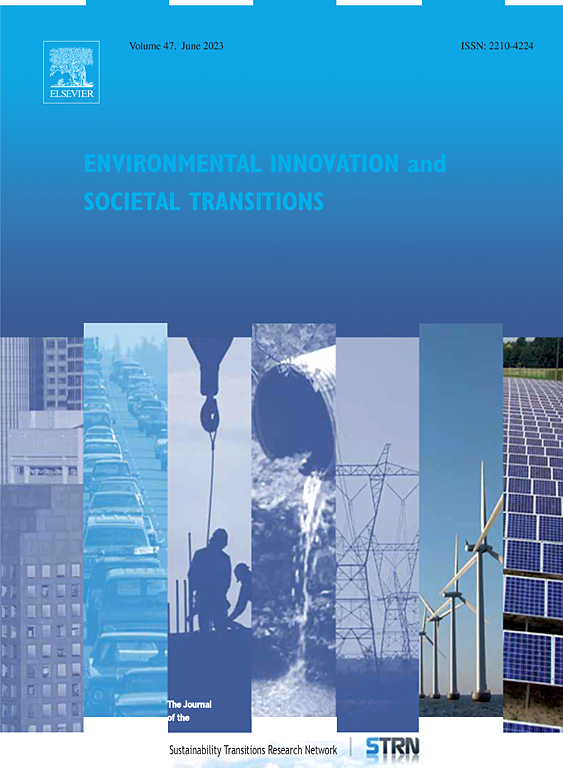Photovoltaic panels diffusion in Switzerland: understanding adopters profiles using clustering methods
IF 6.1
2区 经济学
Q1 ENVIRONMENTAL SCIENCES
Environmental Innovation and Societal Transitions
Pub Date : 2025-04-18
DOI:10.1016/j.eist.2025.100995
引用次数: 0
Abstract
The adoption of photovoltaic panels (PV) by households is essential to meet residential Swiss energy transition targets. While previous studies have mostly focused on the factors influencing PV adoption by comparing adopters with non-adopters, few have acknowledged the heterogeneity of adopters and examined how these factors interrelate and differ among them. This study examines how factors associated with PV adoption differ among groups of adopters, and how these differences relate to socio-demographic, household and building characteristics and the geographic context. In 2022, we surveyed 1300 Swiss PV adopters. To segment the adopters, we used factor analysis and clustering methods factors associated with PV adoption. This multi-dimensional approach revealed recommendations for supporting PV adoption: (i) seize opportunity windows, such as renovations, for professionals to act as change agents, (ii) leverage attitude towards energy-conscious behaviour and perceived control over the technology, and (iii) leverage social influence for vertical diffusion.
瑞士的光伏板扩散:使用聚类方法了解采用者概况
家庭采用光伏板(PV)对于实现瑞士住宅能源转型目标至关重要。虽然以前的研究主要是通过比较采用者和非采用者来关注影响光伏采用者的因素,但很少有人承认采用者的异质性,并研究这些因素之间的相互关系和差异。本研究考察了与光伏采用相关的因素在采用者群体之间的差异,以及这些差异与社会人口、家庭和建筑特征以及地理环境的关系。2022年,我们调查了1300名瑞士光伏用户。为了细分采用者,我们使用了因素分析和聚类方法,与光伏采用者相关的因素。这种多维方法揭示了支持光伏采用的建议:(一)抓住机会窗口,如改造,让专业人员充当变革推动者;(二)利用对能源意识行为的态度和对技术的感知控制;(三)利用社会影响促进垂直传播。
本文章由计算机程序翻译,如有差异,请以英文原文为准。
求助全文
约1分钟内获得全文
求助全文
来源期刊

Environmental Innovation and Societal Transitions
Energy-Renewable Energy, Sustainability and the Environment
CiteScore
13.60
自引率
19.40%
发文量
90
审稿时长
56 days
期刊介绍:
Environmental Innovation and Societal Transitions serves as a platform for reporting studies on innovations and socio-economic transitions aimed at fostering an environmentally sustainable economy, thereby addressing structural resource scarcity and environmental challenges, particularly those associated with fossil energy use and climate change. The journal focuses on various forms of innovation, including technological, organizational, economic, institutional, and political, as well as economy-wide and sectoral changes in areas such as energy, transport, agriculture, and water management. It endeavors to tackle complex questions concerning social, economic, behavioral-psychological, and political barriers and opportunities, along with their intricate interactions. With a multidisciplinary approach and methodological openness, the journal welcomes contributions from a wide array of disciplines within the social, environmental, and innovation sciences.
 求助内容:
求助内容: 应助结果提醒方式:
应助结果提醒方式:


